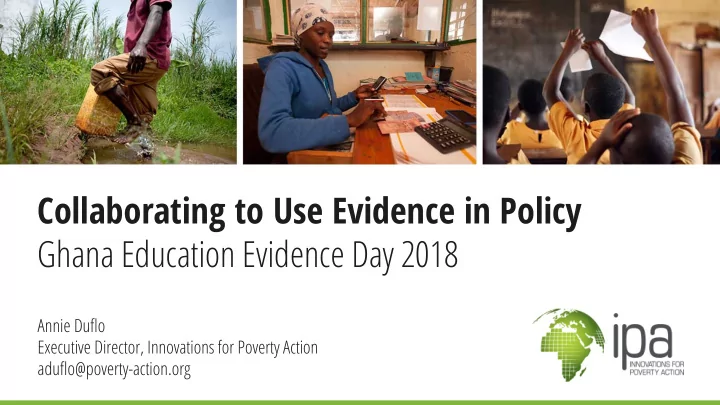

Collaborating to Use Evidence in Policy Ghana Education Evidence Day 2018 Annie Du fl o Executive Director, Innovations for Poverty Action adu fl o@poverty-action.org
Outline • Towards Evidence-Informed Practice and Policy • Partnering to Co-create and Incorporate Evidence: Two Examples • Next Steps
Towards Evidence-Informed Practice and Policy Introduction to IPA and our Partnership with the MoE
We Work with Academics and Decisionmakers to: ? Identify Design Evaluate Incorporate issues or identify these Evidence solutions solutions Into programs and policies Champion the Use of Evidence throughout the process
IPA Ghana Since 2009 750+ studies globally 64 Studies studies
Partnership with the MoE 10 Education Studies; 8 with MoE Since 2009, IPA, MoE, and GES have collaborated on studies • including: Impacts of targeted instruction (TCAI) • How to improve management in scaling up targeted instruction (STARS) • Impacts of teacher training and parental education on KG quality (QP4G) • Impact of SHS scholarships • Returns to apprenticeship training (NAP) • Impacts of improved information on secondary school decisions (GUIIDE) •
Moving Evidence into Practice and Policy ? Identify Design Evaluate Incorporate issues or identify solutions Evidence solutions Educators, decision makers, researchers working closely together to: • Co-create evidence: relevant and rigorous • Build commitment to use results • Strengthen capacity for data and evidence-informed decisions
Partnering to Co-create and Incorporate Evidence: Two Examples
Co-creating Evidence: Targeted Instruction Co-creating Evidence: A partnership with the GES, MoYS, GNAT, IPA Issue : Low, varying learning levels • Potential solution : target • teaching to the pupil’s level Evaluation : TCAI adapted and • evaluated it in Ghanaian context Results: Positive e ff ects on • learning outcomes Funding support: CIFF, DFID, Hewlett Foundation, IGC
Incorporating Results: Strengthening Teacher Accountability to Reach All Students (STARS) A partnership with MoE, UNICEF and IPA Builds on TCAI results • Focuses on equipping • teachers to teach at the level of the child Tests different ways to • improve delivery / fidelity of implementation Funding support: UNICEF, World Bank SIEF
Co-creating Evidence: Kindergarten Quality A partnership with the MoE and other education stakeholders Issue: kindergarten instruction not • adequate to age group Potential solution and evaluation: • co-designed an in-service teacher training to instill play-based learning. Results: classroom quality and • children’s school readiness improved Funding support: UBS Op2mus Founda2on, World Bank SIEF/CIFF/DFID, Bri2sh Academy, NYU, UPenn, Gower Street
Incorporating Results: Scaling the In-service Training How to Apply this Approach at Scale? Continue to ask questions • and iterate as this gets integrated at scale Focus on rural areas • Ensure strong monitoring of • program implementation
What’s Next? Strengthening the Use of Data and Evidence in Decision- making
On-Going Partnership for Evidence-Informed Policies Co-creating Evidence: • Identify pressing issues § Test solutions to understand what works best § Incorporating evidence into programs and policies: • Identify opportunities for nationwide scaling § Iterate to identify and address contextual and scaling challenges § Funding support: Omidyar Network, Marshall Foundation, Hewlett Foundation, Aestus Foundation, Echidna, Three Graces Foundation
Using Data for Delivery & Behavioral Nudges for Good What’s next? Strengthen administrative data à real time, • quality Facilitate data use at all levels, for service • delivery & operational decisions Testing low cost interventions (behavioral • “nudges”) Strengthen embedded analytical capacity to • support reform delivery
Thank you poverty-action.org
Recommend
More recommend